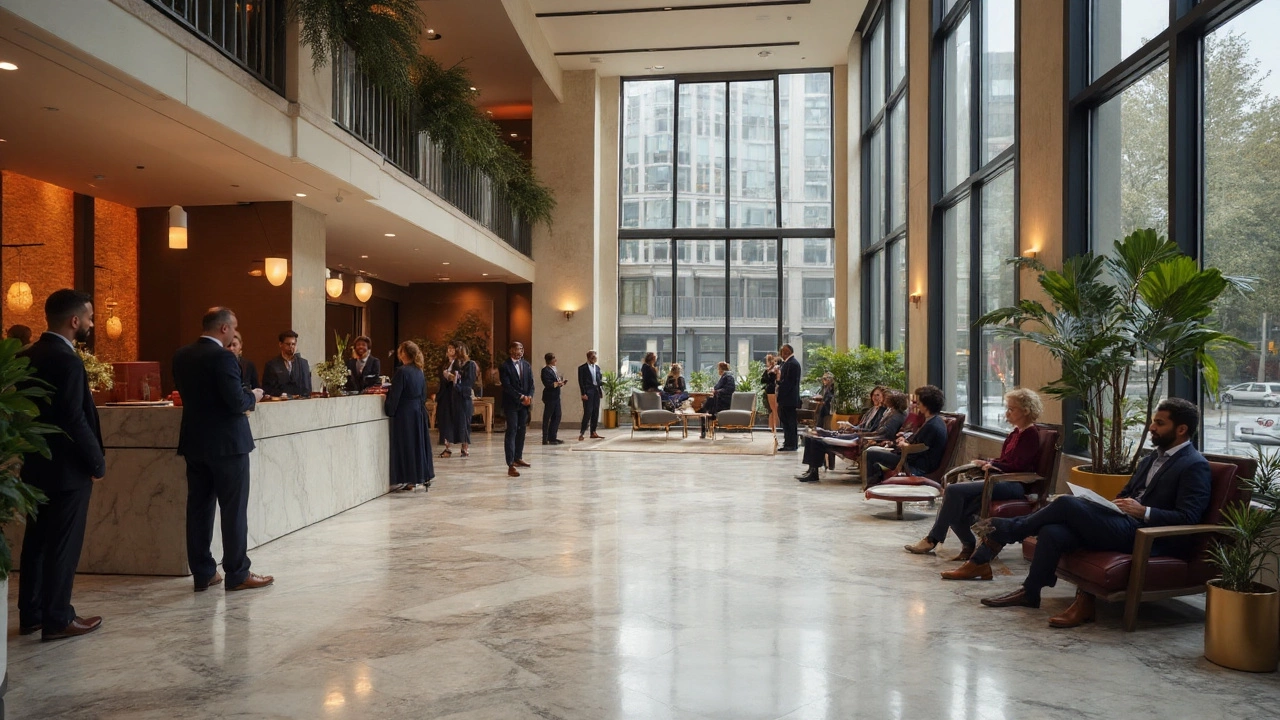Coffee-fueled meetings in lobbies, briefcases rolling down hallways, power suits mixed with pajama pants at breakfast—if you’ve ever wondered where work and travel blend together seamlessly, you’re thinking of a corporate hotel. These aren’t your typical vacation stops. Corporate hotels are designed for people with places to be, Zoom calls to attend, and deadlines to meet, all while being a thousand miles from their office. If you’ve stayed in one, you know the feeling: polished but practical, familiar but efficient. What exactly makes a hotel “corporate,” and why do business travelers keep coming back?
What Sets a Corporate Hotel Apart?
A corporate hotel isn’t just any hotel that welcomes guests in suits. There’s real thought behind the design of these places, both in the little things—like outlets everywhere and strong Wi-Fi—and in the big stuff, like flexible check-ins or conference rooms that run from dawn to midnight. The difference comes down to anticipating the needs of professionals who are away from their normal work setups. It all starts with location. Most corporate hotels pop up where business happens: right next to financial districts, convention centers, airports, and tech hubs. The Boston Seaport and London’s Canary Wharf, for example, are packed with them. Walk out the lobby, and you’re two minutes from an expo, a client’s office, or your next flight. That convenience saves time and stress.
Another clue? The staff. These teams are pros at handling weird hour requests and last-minute print jobs without ever blinking. You can find 6 a.m. breakfasts, on-site dry cleaning, lightning-fast internet, and room service that actually understands you have seven minutes before your next call. Receptionists don’t blink if you need a meeting room at midnight or if you need your suit back from pressing by dawn. Big chains like Marriott, Hilton, and Hyatt even have brands dedicated to this market—think Marriott’s Courtyard, Hilton Garden Inn, or Hyatt Place. These places often offer loyalty programs that make frequent travelers feel at home, even if that “home” is a different hotel every week.
The rooms in a corporate hotel are usually more practical than glamorous. Outlets are everywhere—including right next to the bed. Desks are spacious, chairs are ergonomic, and the lighting doesn’t make you look like a zombie on Zoom. Many come with a mini-fridge, a safe for electronics or documents, and even little extras like coffee machines that actually work. Even the beds are picked with sleep quality in mind—because if you’re running back-to-back meetings all week, you don’t want to toss and turn all night.
Who Stays in Corporate Hotels?
It’s not just executives in town for mega-mergers. Corporate hotels draw in all kinds of professionals. Yes, you’ll find CEOs and sales directors, but also IT consultants jetting around for new projects, engineers on site for installations, medical reps visiting hospitals, and even accountants during tax season. It’s a melting pot of folks who need a reliable, fuss-free place to sleep, work, and regroup before doing it all again.
If you peek into a weekday breakfast room at a business hotel, you'll notice trends. Think people on their laptops before sunrise, teams talking strategy over oatmeal, and lone travelers flipping through their slides on a tablet. During peak conference season, you’re more likely to overhear discussions about quarterly targets or software demos than family vacation plans.
Many companies set up preferred hotel programs, so their employees rack up loyalty points while enjoying discounted rates or perks like free parking, late check-out, or upgraded Wi-Fi. Others book large blocks for conventions or annual meetings. Even government agencies and nonprofits use corporate hotels for training weekends or team retreats—anytime there's a big group that needs serious work time and plenty of sleep.
And it’s not all work, all the time. Corporate hotels often cater to mixed travel—so you might spot a traveler working all day, then heading out to a museum or city tour by night. The new buzzword is “bleisure”: business plus leisure, with hotels adapting for both. Some corporate-focused properties now offer in-room yoga gear, quick city guides, and after-hours networking events to help people unwind after deadline rushes.

Essential Features and Benefits of Corporate Hotels
Here’s where things get interesting—corporate hotels have unique features you won’t always find at resorts or romantic getaways. Need fast, reliable Wi-Fi? That’s a non-negotiable. Studies show that business travelers rank internet quality as their #1 deal-breaker (yep, beating out even comfort or price). Some companies even refuse to contract with hotels that have spotty signals.
Meeting spaces are big business. From boardrooms to multipurpose event halls, these hotels are set up for everything from one-on-one interviews to full company summits. Many properties have “business centers” complete with computers, printers, fax (for the rare folks who love that nostalgia), and even 24/7 tech support. The world’s largest business hotels can host thousands for conventions and expos – New York’s Marriott Marquis has 101,000 square feet of meeting space alone!
Amenities get tailored for non-stop schedules. Think grab-and-go breakfast bars, heated rooftops for impromptu networking, full gyms open at 4 a.m., and private lounges where you can take a client for coffee. Security is tight, too—business travelers carry more gadgets and sensitive docs, so expect keycard-controlled elevators and more cameras. Valet and shuttle services are well-oiled machines, popular in mid-sized cities or places where office parks aren’t walkable.
Long-term stays? That’s handled with kitchenettes and laundry on every floor. Conference planners love hotels with flexible event setups, technician support, or custom food options for dietary needs. Some even have translation services or currency exchange desks for international guests.
Here's a quick reference on features and what percentage of corporate hotels have them, based on real hospitality research from 2024:
| Feature | % of Corporate Hotels Offering |
|---|---|
| High-Speed Wi-Fi | 99% |
| Meeting/Event Space | 93% |
| Early Check-In/Late Check-Out | 85% |
| On-Site Restaurant/Café | 90% |
| Business Center | 88% |
| Fitness Center (24/7) | 76% |
| Express Laundry/Dry Cleaning | 81% |
One pro tip: always ask about loyalty programs or rewards on check-in. Even if you’re not a frequent guest, you can often get perks like free bottled water, device chargers, or late check-out just by signing up.
The Evolution of Corporate Hotels in a Changing World
The pandemic changed business travel—and corporate hotels—almost overnight. Remote work, hybrid meetings, and heightened wellness standards have made these hotels rethink what travelers actually need. Now, you’ll see touchless check-in kiosks, smart elevators, and digital room keys linked on your phone. Many hotels have upgraded their ventilation systems, switched to enhanced cleaning protocols, and rolled out healthier food options.
One major adaptation? Hybrid meeting tech. You don’t always need everyone in the same room anymore. Big-name hotels invested in advanced audio-visual setups, multiple screens, and fast enough Wi-Fi to handle full-company video calls (with few freezes or echoes, thankfully). Some even provide camera kits or ring lights to help you look your best while presenting. If you find yourself in a modern Hilton or Hyatt Place, you might spot coworking-style lounges, pop-up phone booths, and private Zoom rooms meant purely for confidential calls.
Wellness is now front and center. Larger chains offer loaner exercise gear, free meditation apps, healthier room-service menus, and blackout curtains for recovery sleep. If you forgot your running shoes, many Marriott and Westin hotels will rent them out complete with socks—no need to lug gym stuff through airports.
Another twist: sustainability. Companies now ask about eco-certification, recycling programs, LED lighting, and plastic-free amenities before booking. In 2025, properties with strong green policies see higher bookings from big employers, especially in tech, finance, and health. Some corporate hotels have bees on the roof and use leftover food for community donations. Many even send text updates letting guests know about water-saving or recycling practices daily.
Loyalty is big business, too. Hilton Honors and Marriott Bonvoy have digital cards, bonus points, room upgrade guarantees, and all sorts of insider rates for business travelers. These programs often mean less waiting, speedier service, and a bit of predictability—super comforting if you’re in a different city every week. The old “frequent flyer” lifestyle is now a “frequent sleeper” thing, with personal touches showing up in everything from room snacks to remembering your pillow preference.

Choosing the Right Corporate Hotel: Insider Tips & Common Mistakes
Not every "business hotel" fits every kind of trip. If you’re traveling solo for a day of meetings near an airport, you’ll want fast shuttles, express checkout, and a super-quiet room. Heading to a massive conference? Prioritize properties with big event spaces, strong tech support, and early breakfast hours. If you’ll be living out of your hotel for weeks, look for on-site laundry, kitchenettes, and a gym that’s open before sunrise.
A big tip: always triple-check the hotel’s location. Some listings say “near downtown” but mean a $40 ride from anywhere useful. On Google Maps, drop a pin—how far are you from client offices or meeting spots? Walking distance is gold. If you’re arriving late or leaving early, confirm the property’s desk hours, late-night food options, and shuttle schedules. Ask if they have soundproof rooms or blackout curtains if you’re sensitive to noise or light.
Remember, published amenities don’t always tell the whole story. A "business center" might be a single dusty computer—call ahead if you need something essential, like color printing or secure shredding. Review sites are good, but check real-time feedback from business travelers, not just vacationers. If you want loyalty perks, book directly with the hotel instead of through discount sites. Companies sometimes block upgrades for third-party bookings.
And don’t overlook small comforts. A room with a good desk lamp, a shower with real water pressure, and reliable room service for late-night snack runs can make any stressful trip a bit more pleasant. Savvy travelers pack an HDMI cable, backup charger, and offline copy of their presentation just in case. Some hotels let you borrow adapters or portable batteries—ask if you forget yours.
Finally, if you’re mixing business with a bit of sightseeing, corporate hotels are often steps from top restaurants, museums, or parks. Many offer walking maps, discounts to local tours, or can recommend great coffee shops if you need a change of scene to clear your head before the next big meeting.
So next time someone asks, “What’s a corporate hotel?” you’ll know it’s way more than just a place to sleep—it's your home base for hustle, recharge, and everything in between. And who knows? With the right hotel, work trips might just be something you look forward to instead of dread.
